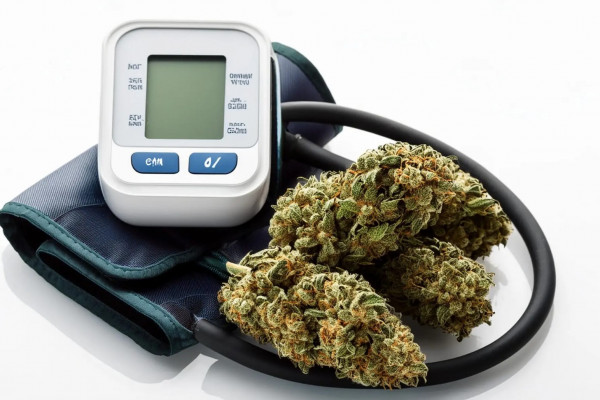0.00 грн.
CheckoutEffect of marijuana on human blood pressure - how cannabis affects blood pressure and its possible medicinal properties

Marijuana, especially from a medical point of view, is becoming increasingly popular as a treatment for a number of diseases. One aspect that is of interest to doctors and scientists is the effect of marijuana on blood pressure. Let's take a look at how cannabis affects blood pressure, whether it can be used to treat hypertension, and what happens to blood pressure after you stop using it.
* The material is for informational purposes only for people over 18 years old. We do not advocate self-medication or cannabis use.
How does cannabis affect blood pressure?
The effect of marijuana on blood pressure is ambiguous and depends on a number of factors, such as
- The method of consumption (smoking, vaping, oral ingestion).
- Dose and concentration of active substances (THC and CBD).
- Human health status, presence of cardiovascular diseases.
The mechanism of action of cannabis on the cardiovascular system
The main active substances of marijuana, tetrahydrocannabinol (THC) and cannabidiol (CBD), have different effects on the body. THC has a psychoactive effect and stimulates CB1 and CB2 receptors located in the nervous and cardiovascular systems. The effect of their activation can include:
- An increase in heart rate (tachycardia), which can increase blood pressure for a short time.
- Vasodilator effect - cannabis, especially CBD, can dilate blood vessels, which leads to a decrease in blood pressure.
As a result, blood pressure can rise briefly due to the effects of THC, but then fall under the influence of CBD.
Treating hypertension with marijuana
The idea of using marijuana to treat hypertension is a matter of active debate among experts. Some evidence suggests that marijuana can help lower blood pressure, but this is not a stable and reliable effect.
Benefits of marijuana for hypertension
Some patients report a decrease in stress and anxiety levels, which indirectly contributes to lowering blood pressure. Cannabis helps:
- Reduce anxiety levels.
- Stabilize sleep, which is important for normalizing blood pressure.
- Reduce inflammation in the body, which can also negatively affect blood pressure.
However, a lack of systematic data and a limited number of clinical trials prevent doctors from using marijuana as a standard treatment for hypertension.
Does marijuana raise blood pressure?
Often in newcomers or those who consume high doses of cannabis, blood pressure can indeed rise briefly. This happens by:
- Increased heart rate.
- Activation of the sympathetic nervous system, which causes the release of adrenaline.
However, in regular cannabis users, the effect can be reversed. An increase in blood pressure can be followed by a moderate decrease due to the body's addiction.
Let's take a look at the factors that affect pressure surges from marijuana
The effect of cannabis on blood pressure can be affected by:
1) Frequency of use - in irregular users, pressure surges may be more pronounced.
2) Individual characteristics of the body - sensitivity to cannabinoids varies from person to person.
3) Cardiovascular system - in people with hypertension or tachycardia, use can aggravate problems.
4) Blood pressure after quitting marijuana.
When a person stops using marijuana, they may experience withdrawal symptoms that affect their blood pressure. Some of the symptoms that occur with cannabis withdrawal include:
- Anxiety and stress.
- Insomnia, which can also lead to high blood pressure.
- Excessive sweating and tachycardia.
How to stabilize blood pressure after quitting marijuana?
To minimize pressure surges after quitting marijuana, doctors recommend
- Regular physical activity to strengthen the cardiovascular system.
- Meditation and breathing exercises to reduce stress levels.
- Consultation with specialists for support during the withdrawal period, especially if you have hypertension.
Let's summarize the results
The effect of marijuana on blood pressure is a complex and multifaceted issue that requires additional research. Cannabis can have both an elevating and a lowering effect on blood pressure, depending on the dosage, method of use, and body condition. In the presence of hypertension, marijuana can be considered as an adjunct, but not as a mainstream medicine.


